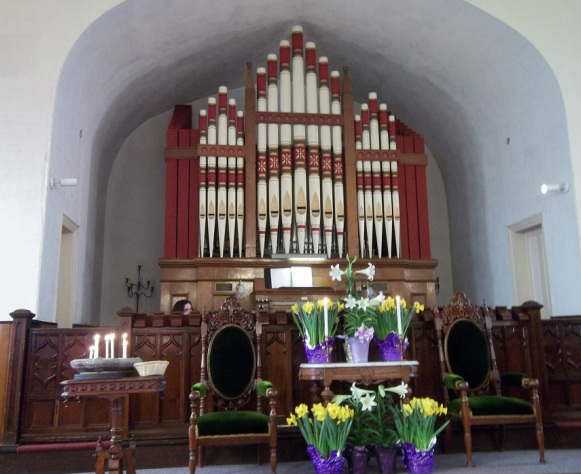We at First Universalist Parish of Derby Line, VT would like to tell you little about our church. Although the church is named First Universalist Parish, we are actually called Unitarian Universalists. The two religions merged in 1961.
Many Universalists are Christians, who believe in universal salvation. They don't believe that a loving God could punish anyone to hell for eternity. Instead, they believe that everyone will be reconciled with God eventually.
While Universalist beliefs have been proclaimed for thousands of years, the faith didn't have the opportunity to form into a widespread religious movement until English Universalists came to America, in the late 1700's, to escape religious persecution. Universalism quickly became popular throughout the United States, especially in rural areas and the expanding western states. The Universalist denomination, called the Universalist Church of America, was formed by 1793.
Universalists were best known for supporting education and non-sectarian schools, but they also worked on social issues including the separation of church and state, prison reform, capital punishment, the abolition of slavery, and women's rights. In 1873, the Universalists became the first group in the United States to ordain a woman with full denominational authority.
Unitarians also called themselves Christians who didn't believe in the Holy Trinity of God (Father, Son, and the Holy Ghost). Instead, they believed in the unity or single aspect of God. Unitarianism eventually began to stress the importance of rational thinking, each person's direct relationship with God, and the humanity of Jesus.
While Unitarian beliefs have been around since soon after Jesus died, people didn't form religious groups based on the ideas until the middle of the 1500's in Transylvania and the middle of the 1600's in England. The religious authorities of the times saw these Unitarians as heretics and they were often persecuted.
Unitarianism flourished in the religious freedom of early America. By 1825, Unitarian ministers had formed a Unitarian denomination called the American Unitarian Association. Speaking out on issues such as peace, education reform, prison reform, orphanages, capital punishment, moderation in temperance, ministry to the poor, and the abolition of slavery. Their liberal voice was soon heard throughout the country.
After growing closer theologically and ethically, the Unitarian and Universalist denominations consolidated in 1961 to form the Unitarian Universalist Association. The new religion no longer holds solely traditional Unitarian or Universalist beliefs, but does draw directly on its heritage for much of its inspiration and spirituality.
Our Social Justice work in the 1970's supported feminism and the rights of gay and lesbian people, as well as combating racism and oppression. In the 1980's spiritual reflection resulted in the denomination reframing our religious principles. Today, all Unitarian Universalist congregations aspire to affirm and promote seven principles:
This is the church of Thomas Jefferson, John Quincy Adams, Louisa May Alcott, Charles Dickens, Ralph Waldo Emerson, Paul Revere, Paul Newman, Pete Seeger, Kurt Vonnegut, and May Sarton.
If you're looking for a sense of community that embraces diversity, spirituality, and some lively discussions, this is the church for you. Services at First Universalist Parish of Derby Line are held at 10:00 AM each Sunday. Religious education is available for children of all ages. If you would like more information about us, please call 802-873-3563.
Many Universalists are Christians, who believe in universal salvation. They don't believe that a loving God could punish anyone to hell for eternity. Instead, they believe that everyone will be reconciled with God eventually.
While Universalist beliefs have been proclaimed for thousands of years, the faith didn't have the opportunity to form into a widespread religious movement until English Universalists came to America, in the late 1700's, to escape religious persecution. Universalism quickly became popular throughout the United States, especially in rural areas and the expanding western states. The Universalist denomination, called the Universalist Church of America, was formed by 1793.
Universalists were best known for supporting education and non-sectarian schools, but they also worked on social issues including the separation of church and state, prison reform, capital punishment, the abolition of slavery, and women's rights. In 1873, the Universalists became the first group in the United States to ordain a woman with full denominational authority.
Unitarians also called themselves Christians who didn't believe in the Holy Trinity of God (Father, Son, and the Holy Ghost). Instead, they believed in the unity or single aspect of God. Unitarianism eventually began to stress the importance of rational thinking, each person's direct relationship with God, and the humanity of Jesus.
While Unitarian beliefs have been around since soon after Jesus died, people didn't form religious groups based on the ideas until the middle of the 1500's in Transylvania and the middle of the 1600's in England. The religious authorities of the times saw these Unitarians as heretics and they were often persecuted.
Unitarianism flourished in the religious freedom of early America. By 1825, Unitarian ministers had formed a Unitarian denomination called the American Unitarian Association. Speaking out on issues such as peace, education reform, prison reform, orphanages, capital punishment, moderation in temperance, ministry to the poor, and the abolition of slavery. Their liberal voice was soon heard throughout the country.
After growing closer theologically and ethically, the Unitarian and Universalist denominations consolidated in 1961 to form the Unitarian Universalist Association. The new religion no longer holds solely traditional Unitarian or Universalist beliefs, but does draw directly on its heritage for much of its inspiration and spirituality.
Our Social Justice work in the 1970's supported feminism and the rights of gay and lesbian people, as well as combating racism and oppression. In the 1980's spiritual reflection resulted in the denomination reframing our religious principles. Today, all Unitarian Universalist congregations aspire to affirm and promote seven principles:
- The inherent worth and dignity of every person;
- Justice, equity and compassion in human relations;
- Acceptance of one another and encouragement to spiritual growth;
- A free and responsible search for truth and meaning;
- The right of conscience and the use of the democratic process within our congregation and in society at large;
- The goal of world community with peace, liberty, and justice for all;
- Respect for the interdependent web of all existence of which we are a part.
This is the church of Thomas Jefferson, John Quincy Adams, Louisa May Alcott, Charles Dickens, Ralph Waldo Emerson, Paul Revere, Paul Newman, Pete Seeger, Kurt Vonnegut, and May Sarton.
If you're looking for a sense of community that embraces diversity, spirituality, and some lively discussions, this is the church for you. Services at First Universalist Parish of Derby Line are held at 10:00 AM each Sunday. Religious education is available for children of all ages. If you would like more information about us, please call 802-873-3563.
3rd Principle: Acceptance of one another and encouragement to spiritual growth in our congregations


